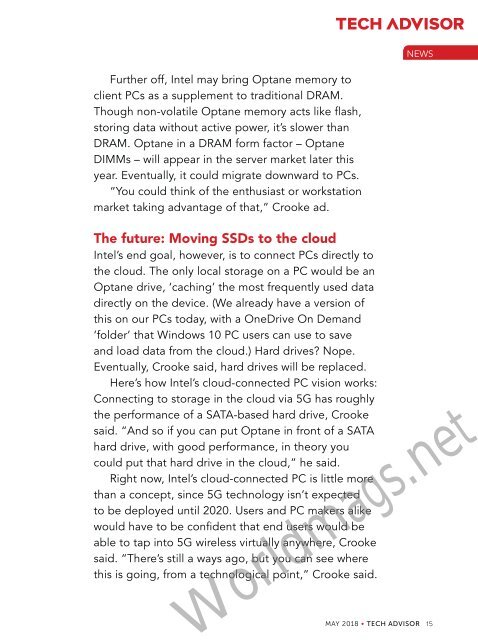Create successful ePaper yourself
Turn your PDF publications into a flip-book with our unique Google optimized e-Paper software.
NEWS<br />
Further off, Intel may bring Optane memory to<br />
client PCs as a supplement to traditional DRAM.<br />
Though non-volatile Optane memory acts like flash,<br />
storing data without active power, it’s slower than<br />
DRAM. Optane in a DRAM form factor – Optane<br />
DIMMs – will appear in the server market later this<br />
year. Eventually, it could migrate downward to PCs.<br />
“You could think of the enthusiast or workstation<br />
market taking advantage of that,” Crooke ad.<br />
The future: Moving SSDs to the cloud<br />
Intel’s end goal, however, is to connect PCs directly to<br />
the cloud. The only local storage on a PC would be an<br />
Optane drive, ‘caching’ the most frequently used data<br />
directly on the device. (We already have a version of<br />
this on our PCs today, with a OneDrive On Demand<br />
‘folder’ that Windows 10 PC users can use to save<br />
and load data from the cloud.) Hard drives? Nope.<br />
Eventually, Crooke said, hard drives will be replaced.<br />
Here’s how Intel’s cloud-connected PC vision works:<br />
Connecting to storage in the cloud via 5G has roughly<br />
the performance of a SATA-based hard drive, Crooke<br />
said. “And so if you can put Optane in front of a SATA<br />
hard drive, with good performance, in theory you<br />
could put that hard drive in the cloud,” he said.<br />
Right now, Intel’s cloud-connected PC is little more<br />
than a concept, since 5G technology isn’t expected<br />
to be deployed until 2020. Users and PC makers alike<br />
would have to be confident that end users would be<br />
able to tap into 5G wireless virtually anywhere, Crooke<br />
said. “There’s still a ways ago, but you can see where<br />
this is going, from a technological point,” Crooke said.<br />
Worldmags.net<br />
MAY 2018 • TECH ADVISOR 15


